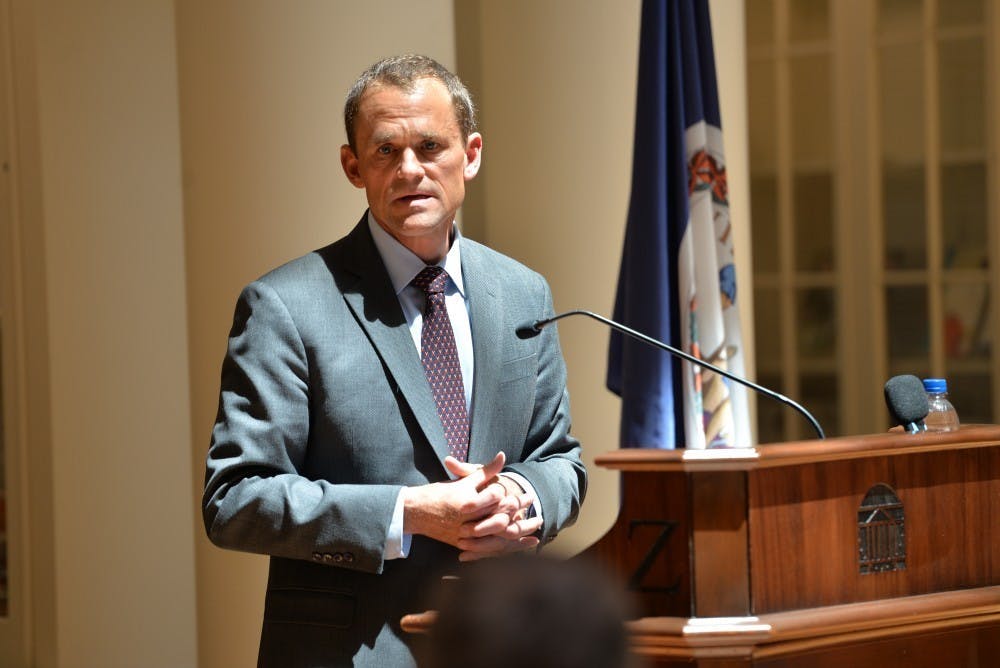In recent years, the cost of living in Charlottesville has continually increased. Housing, water and gas prices have all become more expensive within the past two years. This increase falls heavily on low-wage workers. Seeing as the University is the largest employer in the City of Charlottesville, it is in a unique position to address these issues.
Soon after University President Ryan took office, some members of the University community called on him to institute better wages for members of the University community. In order to solve this issue in a comprehensive, well-researched manner, the University created a new administrative position called a “community resource specialist” who would work with employees to help them find necessities such as housing, food and utilities. The creation of this position primarily aims to direct low-wage workers to community resources but its creation has already faced criticism since it was posted in mid-October. Despite its intention to help wage-earning employees of the University, many in the community have interpreted it as a way to excuse inaction regarding wage policy. While this initiative may be helpful to wage-earning workers, the implementation of a new living wage policy at the University is the best way to solve many of the issues that the community resource specialist serves to address.
Scott Seal, the senior director of the Office of Human Resource’s Total Rewards Team has stood by the creation of this position, and adds that the decision to reevaluate and raise wages is “not off the table.” Nevertheless, raising the minimum wage should solve the issues this position is meant to do. Assistance programs such as those created by the community resource specialist should be the last resort for members of the University community, not the first action taken. If there is sufficient need to warrant the creation of this entirely new position, there is equally sufficient need to raise the wages of University employees in a time-efficient manner.
Ryan, on the other hand, has discussed the issue of wages, implying that they will eventually be increased by University officials. In fact, he created a working group focused on relations between the University and local community. Like the community resource specialist, this group is one of the many initiatives that Ryan has rolled out in order to improve the University’s relationship with and impact on the Charlottesville community. This group would strive to better a number of issues, “which may include wages, housing, education and healthcare.” Still, this group only provides the intention to discuss increasing wages in the future.
Ryan did reportedly promise the Living Wage at UVA campaign that he would increase wages by the end of the 2018-19 academic year. Notwithstanding this, in a Facebook post from Sept. 14, Ryan stated that he wishes to take time to research this issue in order to put forth the most “holistic strategy” possible. Regardless, Ryan has made no clear statement about the extent to which wages could increase or to whom this potential increase would apply.
While a wage increase would be helpful to all members of the University community, it would be most helpful to all contracted workers. Contracted workers at the University include a range of different positions. For example, food service, warehouse and utilities jobs at the University are all contracted from Aramark. The University's minimum wage is currently $12.38. This is slightly above the $12.09 wage necessary to live in Charlottesville. However, dining workers, who are hired by Aramark Co., are paid a starting wage of $10.65 per hour, which is well below the Charlottesville living wage. The living wage increases to $27.09 for a single working adult with a child and $30.79 for a single working adult with two children. These workers face the same increases in living standards as other members of the community, and deserve to be fully included in any wage increase plan. If the University wants to pursue a living wage, it is necessary that this applies to all workers on Grounds.
Moreover, the Charlottesville City Council voted in 2017 to agree that the Charlottesville living wage is $13.79 for city workers. This wage is also set to increase to $14.20 in the coming fiscal year, and to $15 by 2021. Mayor Nikuyah Walker also indicated that she hopes other institutions within Charlottesville take steps to establish similar wage policies. If the University wants to help improve the lives of its workers and create a better working relationship with the City of Charlottesville, it is essential that officials prioritize the welfare of its workers.
In comparison to the City Council, University officials have made very little effort to ensure that their workers have the means to do more than just simply survive in Charlottesville. Hopefully the sentiments put forth by the city and larger Charlottesville community can push Ryan in the right direction and encourage him to create a proposal that increases wages for all low-wage workers at the University.
Victoria McKelvey is an Opinion Columnist for The Cavalier Daily. She can be reached at opinion@cavalierdaily.com.





